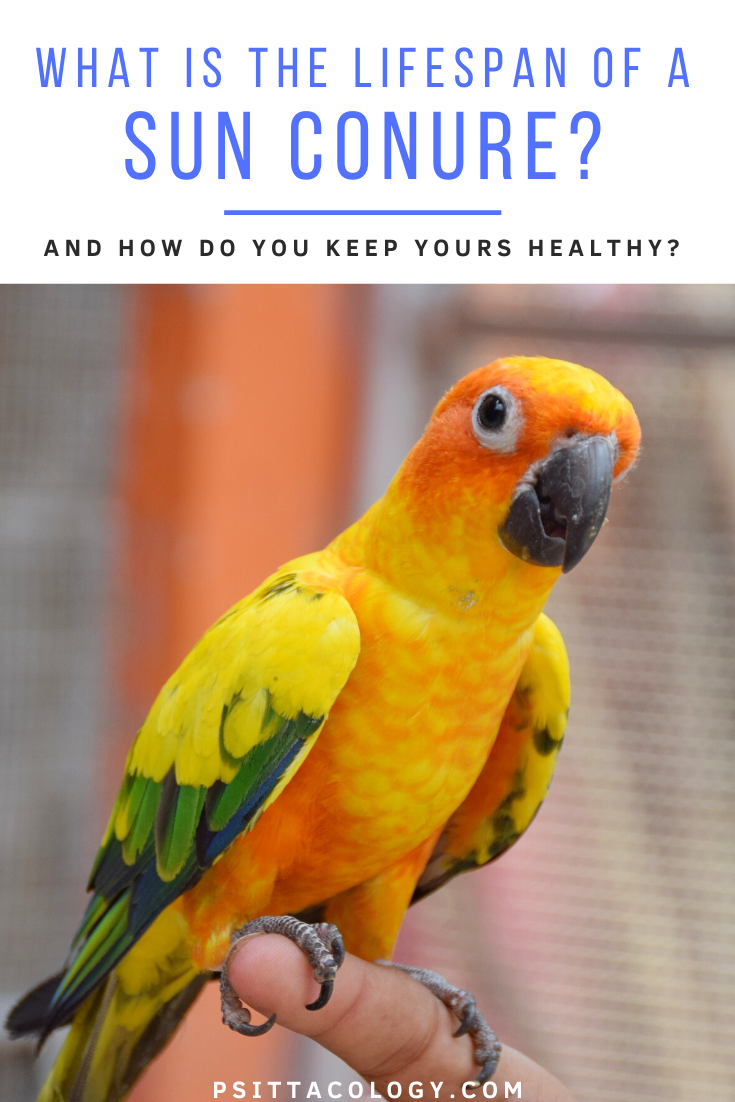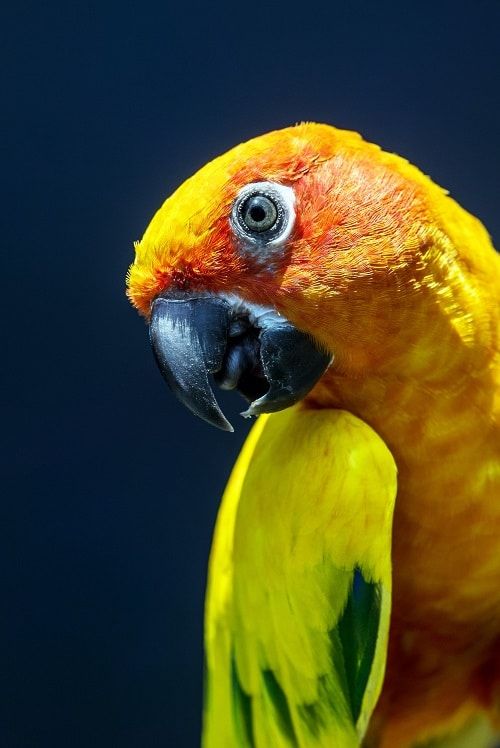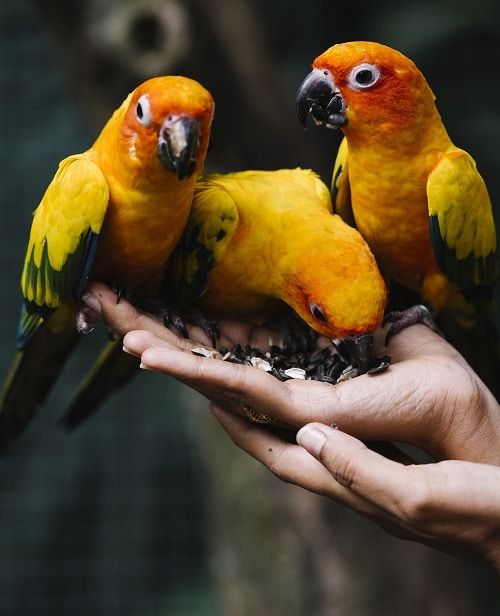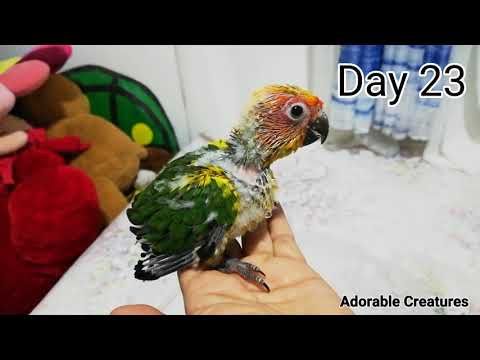If you just got your sun conure or are thinking of adding one to your feathered family, you’re probably wondering about sun conure life span. How long can you expect your bird to be around for? Good news: quite a while! With proper care and a healthy diet, these neotropical parrots can be a part of your family for years to come.
Keep reading for everything you need to know about sun conure life span and making sure yours lives a long and happy life!
This post contains affiliate links. If you make a purchase, a small percentage will go directly to Psittacology at no additional cost to you. Thank you for supporting Psittacology!
How long do sun conures live in the wild?
According to Animal Diversity Web, the lifespan of sun conures in the wild is not actually known at this point. As stated by this source, the habits and life cycles of sun conures in their natural habitat haven’t actually been studied closely yet, owing to the fact that the areas they live in are usually pretty inhospitable.
Of course, as with all parrots, it’s to be expected that sun conures don’t live quite as long in the wild as they do when well-cared for in captivity.
Sun conures are endangered in the wild, owing to habitat loss caused by human activity like cattle grazing. The capture of wild sun conures for the animal trade and food or to protect crops is not allowed but it likely still happens.
On top of the dangers that humans pose, sun conures also have natural predators to deal with. They naturally occur in tropical areas: open savannah as well as more densely forested areas along the Amazon riverbank, always at low altitudes.
Because they nest in trees, sun conures are especially vulnerable during the nesting season, when predators like snakes and monkeys can intrude to steal chicks and even adult birds.

What is the lifespan of a sun conure in captivity?
The breeding season for sun conures falls early in their natural habitat, usually in February. In captivity, they usually breed a bit later, when spring is in full effect.
Chicks become independent around 10 weeks and reach sexual maturity at 2 years of age. After that, they still have a long life ahead of them, as sun conures tend to live for a minimum of 15 years with good care.
Ages of 20 or more are not uncommon and there are even birds that reach 30.For example, in a study that analyzed 529 sun conures, the highest recorded age was 29.7 years. The median age among adult birds was almost 19.
What influences sun conure life span?
You! You influence your sun conure’s lifespan. Although these neotropical parrots can make it to the respectable age of 30, that doesn’t mean it’s a guarantee.
There’s always the possibility of premature passing due to a disease that you can’t do anything about or unfortunate accidents, but in the end, good care is the most important factor. Sure, maybe your sun conure just doesn’t have the genetics to make it to the high end of the age spectrum, but 15-20 years or more should be totally attainable.
Let’s go into some of the things you can do to ensure that your sun conure makes it to a respectable age.

Diet
Probably the most common cause of premature passing in all parrots, including sun conures, is bad diet. The myth that parrots can survive on nothing but seeds is still pervasive.
Many sun conures end up obese and with a myriad of related health issues due to overfeeding and fatty diets that are high in foods that should really only be treats, like sunflower seeds.
Although wild sun conures do eat seeds (unripe, ripe and sprouting), they also consume many other foods. Fruits make up a good part of their diet; according to ADW, they especially have a taste for red cactus fruits and berries of the Malpighia tree. Other than that they’ll feed on nuts, seeds, flowers, the occasional insect and, to the dismay of farmers, human-grown crops.
With our domestic birds, we should always do our best to offer an equally varied diet to make sure they get all those precious micronutrients. What we shouldn’t do, however, is feed them as much as wild birds eat: our feathered friends don’t exactly use as many calories on a daily basis as their wild counterparts do while flying around searching for their next meal.
A good sun conure diet can consist, among other things, of:
- Plenty of veggies like broccoli, leafy greens, peas, carrots and more.
- The occasional fruit: although wild sun conures eat a lot of fruit, it’s too high in sugar to feed large amounts of it to our domestic parrots.
- A high-quality pellet food that doesn’t contain added sugars.
- A high-quality seed mix, preferably without addictive sunflower seeds.
- Fresh sprouted seeds, which you can do yourself using your normal seed mix or a more varied sprouting mix.
- Foraged foods from low-pollution areas without pesticides: garden weeds (dandelion leaves, clover), fresh flowers (chrysanthemum, daisies) and fresh grasses.
- Extra: cooked grains like black rice, quinoa, whole wheat pasta, buckwheat, oats, etc.
Don’t forget to also offer a mineral block and multiple sources of fresh water.

General care
In order to prevent accidents, stress and diseases that stem from environmental causes, there are a few general care guidelines that you should always keep in mind.
- Air quality: Birds, including parrots, have extremely sensitive lungs. A nice scented candle is a joy for us but can shorten sun conure life span, for example. Other common culprits to avoid at any cost are aerosolized scented products, cigarette smoke, fumes from teflon cookware and air fresheners.
- Social life: Sun conures live in large flocks in the wild and they have evolved to be extremely social. A lone conure that doesn’t get enough attention from its owner will be stressed out of its mind and can not only develop behavioral issues but also physical problems like feather plucking and self-mutilation.
- Exercise: A good diet is the biggest factor in preventing parrot obesity, but regular exercise is necessary as well. Your conure will love spending daily time out of its cage not just so it can socialize with you and explore, but also because it offers a great chance to stretch those beautiful wings.
It’s also a good idea to offer plenty of parrot toys to keep your bird extra busy.
- Parrot-proofing: Any space that you let your sun conure roam free in, including its own cage, should be inspected to make sure there are no dangers.
Electricity cables make attractive chew toys, open windows are a huge danger and unsafe toys have killed or maimed many parrots. They’re so curious they just get in trouble easily!
- Vet & emergencies: You should have the number for a trusted avian vet handy at all times. Ideally, you should be taking your conure there not just when it feels under the weather, but also for yearly check-ups.
Have an emergency kit ready with items like tweezers, a blood clotting agent and anything else you think might prove useful.
How old is my sun conure?
We all want to know how old our bird is so we know how much time we can expect to enjoy with it and to identify age-related issues (like the parrot “terrible twos” when they reach sexual maturity).
If you bought your bird from a breeder you’ll usually know exactly when it hatched, and even if you weren’t told, it’ll often have a leg band that shows the hatch date.
If you got your parrot from a pet store or if it’s a rescue it might be a bit more difficult to figure out its age. You can ask around some but unless the bird is still a juvenile, you’re pretty much out of luck when it comes to determining sun conure age visually.
Young sun conures that haven’t yet reached a year and a half will have different plumage than adult ones. Their feathers are much greener in color and they don’t have that typical sunny yellow yet until they molt and their adult colors grow in. This makes sense: the green color offers great camouflage in the wild!
Other than this color difference in young birds, it’s not possible to see how old a sun conure is.
If you have any more questions about sun conure life span or if you want to share your own experiences with these colorful South American parrots, don’t hesitate to leave a comment below!


I have a sun conure 8 months old male and female 3 years old but she is 3 times putting eggs but no babies, how long it takes the male to get sexual age for babies
Thank you
They both have to be at least around two years old. Be sure to do a lot more research if you’re interested in breeding your birds while you wait for the male to reach the right age. It’s a big responsibility. Good luck!
I’ve owned my little Skipper for around 11 years now and I love him very much. He sets on my shoulder and sings up a storm. He also loves to dance on me when I sing to him. They make great pets.
Thanks for sharing, he sounds like a great bird and as you can see from the article, with some luck he’ll be around for plenty more years 🙂
Can my sun conure & my iguana cohabitate in a fairly large enclosure?
No! Iguanas are aggressive and your conure would most likely try to bother it. Parrots can’t be combined with any other pet, sorry! Many parrots can’t even be combined with other parrot species aside from their own or a select few species in the same enclosure.
My Green Cheek Conure is about 15 years old now. I know that their average life span is about this long, but can be up to 30 years. What should I expect to happen when he’s getting near the end of his life, if he’s healthy?
A healthy but old bird will usually slow down a good bit. They can become scruffier-looking and their eyesight may not be as good anymore, as they can develop cataracts. You may have to adjust his cage a bit to prevent him from falling or injuring himself, as you would for a handicapped bird. Joint issues can be a thing, so it’s important you visit the vet on a regular basis for a check-up to make sure he isn’t in pain or discomfort.
I know all this sounds a bit daunting, but really, a lot of parrots do pretty well in their older age. Hope you get to spend at least 15 more years with your green!
I know this is about sun conure life span but I’m sharing that my nanday conure is coming up on her 34th birthday. She was estimated to be a year old when we purchased her in June1990 and she’s been ours ever since. I’m amazed at her lifespan and while she has really slowed down and has vision problems so flight is now scary for her, she eats, preens and screams like a young conure!
As I’m sure you know, nandays and suns are very closely related, so this is absolutely relevant for nandays too 🙂 Thank you for sharing, that’s amazing. You’re clearly doing something right!
My conure is now 30 years old. He has a plate he has been more on the bottom of his cage. He loves to usually make nests in his newspapers, but there is tipping, mainly as soon as I cleaned the cage but now I find him down there much more often. And he sleeps more under the paper where he feels secure and he’s been throwing all of the food out of his cupholders, making a huge mound on the bottom of his cage. I just got done cleaning him. He went back on tap and ate a little bit of fresh food took some water but now he’s back on the bottom which does not surprise me because it’s clean and he likes to usually shred the paper but today he went back underneath a piece that he loosened up and he’s resting. He closes his eyes, I don’t know if I should be concerned at this point in time.
Wow, amazing job on getting your conure to such a respectable age. Given how old he is and the fact that it seems almost like he’s trying to hide, I would personally ring my avian vet and explain the situation. They will be able to tell you whether they think you should bring him in for a check-up or not. I’m keeping my fingers crossed for it being nothing, but it’s better to be safe than sorry!
We have a 30 yr old Sun . Houdini is his name and he has his own personal tent to sleep in when ever he wants . Keeps him from slipping off his perch when sleeping.
Thanks for sharing, that’s awesome! You must be doing something right. Say hi to Houdini for me 🙂